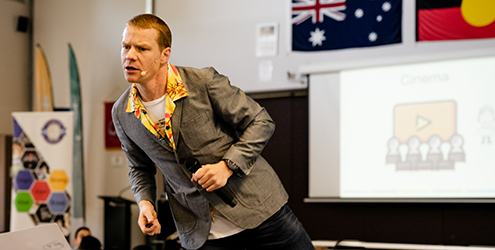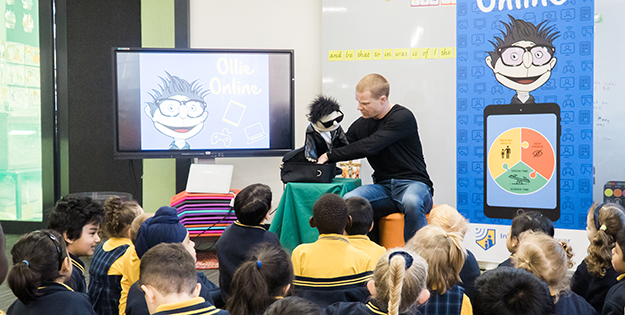Global
Copyright@ Australian Catholic University 1998-2026 | ABN 15 050 192 660 CRICOS registered provider: 00004G | PRV12008
Copyright@ Australian Catholic University 1998-2026 | ABN 15 050 192 660 CRICOS registered provider: 00004G | PRV12008

When Martin McGauran enters a junior primary classroom to deliver a cyber safety workshop, he always brings along his co-star: a rambunctious puppet named Ollie Online. Ollie helps him to engage the kids in a fun, interactive manner, while still delivering the important messages that will help to keep them safe.
As a result of the rise of the digital era and the relatively recent emergence of touchscreen technology, children of this age and even younger are accessing the internet more than ever before.
And many of them are ill-equipped to handle the risks.
“We often hear parents saying that their kids are really tech-savvy, and in one sense that’s true – they are adept using the touchscreen to open apps and navigate a device,” says Mr McGauran, who has delivered cyber safety workshops to over 120 Australian primary schools since 2018.
“There’s also a very real potential they will come into contact with things online that they’re not prepared for in a developmental sense – challenging situations that can be really ugly and harmful.”
Alongside these challenges, digital technology can offer many opportunities to young learners.
Martin McGauran saw firsthand the power of technology as a learning tool in his former life as a primary school teacher.
“I started in primary teaching without a huge knowledge of tech in the learning space,” says Marty, who graduated from ACU with a Master of Teaching (Primary) in 2009.
“But I soon started to see how powerful technology was – the way it engages young students and offers them new ways of communicating and gathering information – and that led me on a path of being really passionate about using it to enhance teaching and learning.”

Martin in action.
In the years that followed, Marty took on leadership roles within various primary schools, assisting and supporting his fellow teachers in the digital space. He quickly observed that in many cases, schools were using technology in a highly tokenistic way.
“It was often just a box-ticking exercise in primary schools, particularly the trend of one-to-one devices, with lots of schools trying to ‘keep up with the Joneses’,” he says.
“What was really lacking was a deep understanding of how to use technology to its full potential in the classroom – looking at how it can enhance kids' communication, collaboration and connection.”
A decade down the track, with years of teaching and digital consulting experience under his belt, Marty’s focus shifted when he observed a new problem emerging.
While laptops and tablets are now widely used in preschools and primary schools, there remains widespread unease about the heavy presence of digital technology in the lives of children, with experts warning it can be a double-edged sword.
“I’d spent years seeing all the amazing thing that kids were doing online,” Marty says, “but then I started to hear more and more stories from parents and principals around some of the challenges kids were encountering in the online space – both in the classroom and at home, where they often have unfiltered internet access.”
Realising the importance of digital literacy amongst schoolchildren, Marty teamed up with his sister, the psychologist Carley McGauran, to establish Inform and Empower – a business that guides and mentors families and school communities to be safe online, through workshops for teachers, children and their parents.
Experts have identified three main risks facing children that access the internet: contact risks, which involve coming into contact with unscrupulous adults; conduct risks, which include kids unknowingly compromising their device through viruses and in-app purchases; and content risks, which involve exposure to hypersexualised or low-quality content on social media apps like TikTok.
With the help of Ollie and his other characters, Marty addresses these risks in a high energy, interactive presentation that teaches kids about the internet, the value of balancing screen time with ‘green time’, and perhaps most importantly, the need to engage trusted adults when challenges arise online.
“Kids of a certain age know that if they’re crossing a busy road, they do that with their mum and dad and never go off by themselves,” he says.
“We want them to translate that into the online space, so they’re constantly checking in with their parents, asking questions and not straying too far without the help of a trusted adult.”

With Marty’s expertise in edu-tech and Carley’s psychology and parenting background, Inform and Empower has made a name for itself as a Trusted eSafety Provider which assists school communities in a way that successfully engages young students.
As well the Ollie Online program, they offer the Thrive Online program for students in years 3 to 6, and workshops for both teachers and parents.
Their main goal, Marty says, is to help school children to be more aware of the potential dangers of the internet.
“The idea is to arm them with new ideas and new strategies, so that when they do come across challenges or things that might be confronting, they can come up with solutions to manage them,” he says.
“What we do is almost like a shot in the arm, a little conversation starter, but it definitely doesn’t end there … it shouldn’t be, ‘Oh, Marty’s been to our school, so the kids are cyber safe’. I’m just planting a really small seed that hopefully will allow them to grow into safe and responsible digital citizens.”
Children who have the skills to manage the risks of digital technology are more likely to tap into the possibilities that it brings.
“The schools that are really thoughtful in this space, that support their teachers with professional learning and engage their students in proactive ways, they’re the ones more likely to be using digital technology in positive ways that aren’t tokenistic,” Marty says.
“If we instil a mindset in kids that helps them to manage the challenges, tech can be an amazing tool – it engages a child’s brain in a way that enhances learning, that prompts creativity and problem-solving, and that helps kids to collaborate and learn in ways we’ve never seen before.”
Keen to study teaching at ACU? Explore the options.
Find out more about Inform and Empower.
Copyright@ Australian Catholic University 1998-2026 | ABN 15 050 192 660 CRICOS registered provider: 00004G | PRV12008